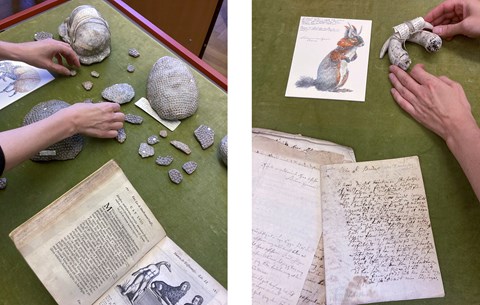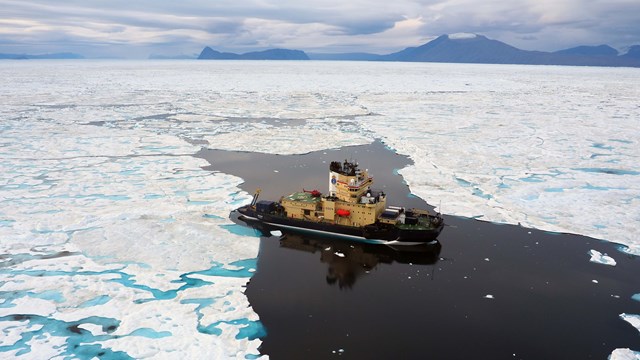"In my art, I build my own worlds and realities where I can investigate the unknown"
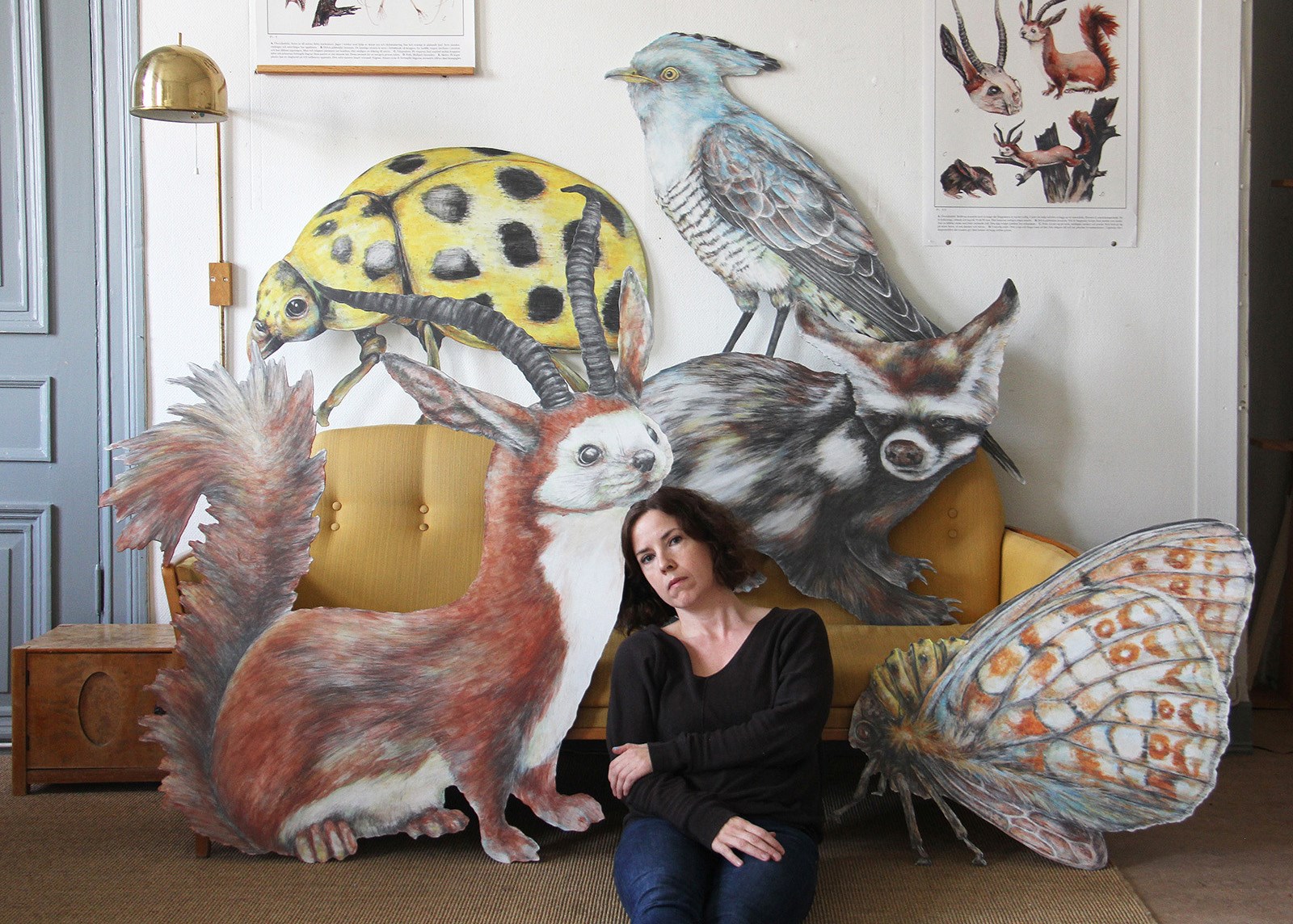 From the work "Jonas Flack - observations of a rejected explorer" Design assignment for a preschool in Skellefteå. Installed December 2021. Photo: Ida Rödén
From the work "Jonas Flack - observations of a rejected explorer" Design assignment for a preschool in Skellefteå. Installed December 2021. Photo: Ida Rödén
The artist Ida Rödén will participate in this year's research expedition with the icebreaker Oden. Along for the ride is Jonas Falck, a fictional scientist who considered himself one of Carl von Linné's apostles ‒ but was never accepted by Linné. Ida Rödén has explored the world with Jonas Falck since 2014. She has sometimes thought that the work with the scientist is over. But every time she has set a point and shifted focus, something new has begun to loom. The exploration continues, and this time, the two companions will visit the Arctic Ocean.
Can you briefly introduce yourself?
My name is Ida Rödén, and I was born in 1981 in Härnösand, where I also grew up. I received my bachelor's degree in liberal arts at Umeå University of the Arts in 2008. Then I moved to San Francisco, receiving a master's degree at California College of the Arts in 2011. After four years in San Francisco, I moved back to Sweden, and since then, I have lived in Stockholm.
What was your first thought when you received the news about the place on Oden?
Wow, I immediately felt my heart pounding very hard. I've done a few artist residencies, but nothing compares to this. It was a mixture of joy and fear. What have I gotten myself into? That's how I felt. Before accepting, I talked to my husband, and he said I absolutely must go. I could always say no, he said. But you can't say no. Not to this. My heart was pounding hard because I knew I was already heading for the polar regions.
I have a favourite quote that I imagine many scientists can identify with as well. The quote comes from one of Plato's dialogues where Meno asks: "And in what way do you intend to search for that which you do not know at all what it is." Those words describe my way of working as an artist quite well. – Ida Rödén
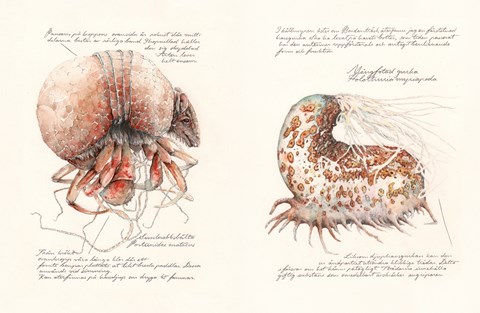
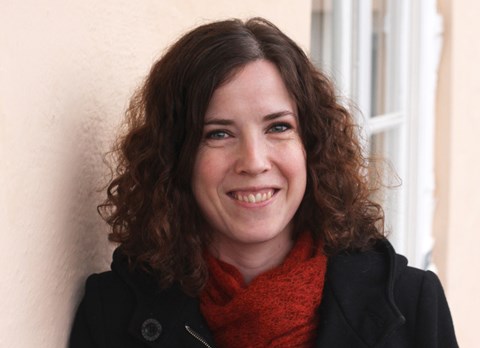
Why did you decide to apply for our artist programme?
Since the first time I heard about the artist program, it has been a dream to be able to participate. I have always been attracted to the way the travellers of science plunged into the unknown. It is of course scary, what happens inside us, when something completely different surprises us before we know what it is. But it is also powerful. Imagine being in a movement where the world constantly unfolds and shows itself from a new side. In my art, I build my own worlds and realities where I can investigate the unknown, but this journey would give reality more dimensions. Moreover, now my children have grown enough that I can once again travel on my own and embark on uncertain, exciting, and scary adventures.
How would you describe your artistry?
I have a favourite quote that I imagine many scientists can identify with as well. The quote comes from one of Plato's dialogues where Meno asks: "And in what way do you intend to search for that which you do not know at all what it is." Those words describe my way of working as an artist quite well. I often start from a thought, something I've encountered that I can't let go of. So I am drawn to this unknowing, and around it, I build worlds – installations with drawing, text and sculpture – where I can fully observe and appreciate what baffles me. But I'm not looking for anything specific, rather I'm looking to create situations where I can continue to wonder. The feeling of uncertainty is important. It's the possibilities that are interesting.
Combining science and art has always attracted me. Reality can be described in widely different ways and still be true. It is great to be part of a genuine research expedition. It's something I just thought I'd get to read and fantasize about. – Ida Rödén
You will take Jonas Falck with you on the expedition. Please tell us a little about him.
Jonas Falck lived at the end of the 18th century and considered himself one of Carl von Linné's apostles. But Linné never accepted him as an apostle, and as it turned out, he had to continue on his own. I have worked with Jonas Falck since 2014. He has become a fellow traveller who makes me see the world in new ways. Over the years, we have carried out several expeditions, including to Kultsjön in southern Lapland, to Norra Kvarken in Västerbotten and to Fårö, where we recorded unusual discoveries. It is not easy to describe Jonas Falck – sometimes we are one and the same, sometimes he is absent and other times my closest conversation partner. I hope he will keep me company on Oden. Perhaps he will appear among the melting ice.
When we read about our great explorers, it often appears as if they were completely alone. I think Jonas Falck mostly travelled on his own. He was not recognized; he did not come from an academic family and lived far from a central location. But maybe a trip occurred where he was part of a larger context? Perhaps he went to our polar regions? We can never really know. Everyone involved is dead. I like to think about what could be – and indeed, it could have been that Jonas Falck was once in the Arctic Ocean.
I am constantly moving between different times. Now or then has no direct meaning, neither fantasy nor reality. Actually, Jonas Falck has two different years of birth. He was born on 9 October 1748 in Västernorrland. But he was also born in 2014 when I encountered a strange stone at Kultsjön. Had I not discovered that stone, Jonas Falck would not have existed, neither now nor then. I quote Menon again: "And in what way do you intend to search for that which you do not know what it is." I had no idea I was looking for that rock until I found it.
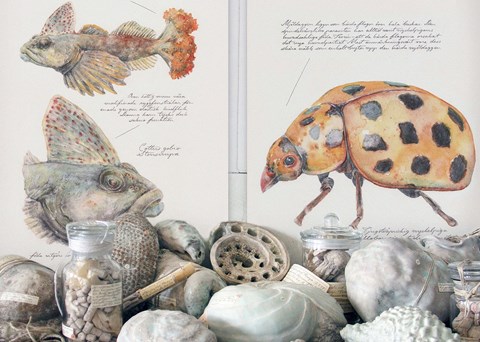
Your application mentions exploring aquatic animals as an example of your work aboard Oden. Please tell us about that idea and how it relates to your previous work.
Water is alluring. We cannot know so much, especially in our deep waters. For me, it is fascinating that there are, for example, jellyfish that can return to an earlier stage of development and become a younger copy of themselves. It is as if time exists entirely differently in the sea.
While writing my application, I read a bit about the oceanographer William Beebe (1877–1962), who studied the creatures of the deep sea. "Being bored is immoral," Beebe explained. "All a person needs is the ability to see. Nature tells us the most exciting adventure stories, but we must use our eyes." In a bathysphere, he could reach a depth of 923 meters. No sunlight could penetrate down there. Deep down there, Beebe said, "lay a world that looked like the pitch-black mouth of Hell itself." When Beebe returned to the surface, he collaborated with artist Elsa Bostelmann who made detailed depictions of the creatures he had seen down in the depths. Perhaps Jonas Falck had a similar relationship during the trip to the Polar area and drew what someone else observed? The beauty of Jonas Falck is that the framework of logic does not limit him. That's good because no one knows what's hiding in the depths.
How do you feel about being part of a research expedition?
Combining science and art has always attracted me. What we call reality can be described in widely different ways and still be true. It is great to be part of a genuine research expedition. I just thought I'd get to read and fantasize about it. Everyone who travels with Oden will be an expert in their field; I am fascinated by people who have delved into areas I have difficulty grasping. But of course, I'm also nervous and understand that there will be many days when I sit there in my container and wonder what I've gotten myself into. What is my place in the context?
What are you most looking forward to?
I look forward to seeing the ice, the sea, and the horizon. I'm looking forward to the midnight sun, although I'm sure I'll get enough of it eventually. Then I look forward to seeing all the scientists at Oden, noting how they work and listening to their stories and theories. See what meetings arise and how conversations between people from different fields can open new realities.
I am also curious to see what will happen to me. Being on a boat for weeks, in an uncertain place, with previously unknown people, does something to an artist. In the unknown, with all the horizons wide open, I imagine that thoughts are given space to do a little as they please. It will be very interesting and a little scary.
Anything else you want to say?
I, of course, want to say thanks! It feels fantastic to be offered a place at Oden and be part of this polar adventure!
